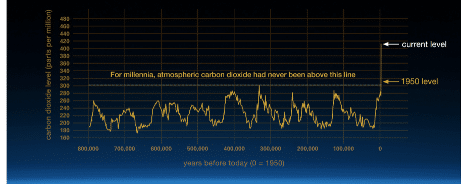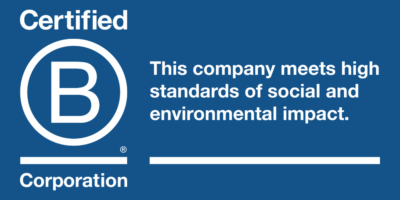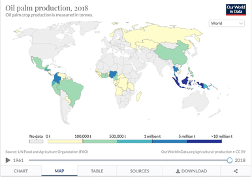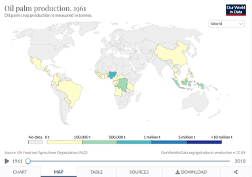As socially responsible or ESG (Environmental, Social, Governance) advisors, Riverwater Partners understands that corporate social responsibility is a journey and not a destination. Individuals, businesses, and government entities all must continually adapt to new normals as the world changes.
Climate change is a concept that first emerged, and then only in theory, roughly 50 years ago.The graph below based on the comparison of atmospheric samples contained in ice cores and more recent direct measures provide evidence that atmospheric CO2 has increased since the industrial revolution.

(Credit: Luthl, D., et al.. 2008; Etheridge, D.M. et al. 2010; Vostok ice core data/J.R. Petit et al.: NOAA Mauna Loa CO2 record).
Prior to 1950, the level of atmospheric carbon dioxide had never been above 300 parts per million. As it continued to rise, scientists began to link it to extreme weather events, which have led to a rise in natural disasters, which have further led to a plethora of problems for the world and its inhabitants. This realization that the elevated level of atmospheric carbon dioxide is the root cause of numerous global issues has forced us to focus on reducing the world’s carbon footprint. It seems quite logical that prior to making this link, the world didn’t question the production and use of fossil fuels to propel worldwide innovation and economic development forward. Today, however, we must not only question it; we must work to change it.
Likewise, food production and consumption have been changing over time. As the world population has grown and continues to grow, the responsibility to feed it has, as well.
Palm oil is a raw ingredient used in a variety of foods consumed globally; the graphs above show the growth in palm oil sourcing from 1961 to 2018.
Nestlé, the world’s largest packaged food company, understands this well. As a major producer of palm oil, Nestlé has had to adapt its sourcing of palm oil over time to meet growing demand, while protecting the environment and the farmers who produce it. As a leader in sustainable business practices, Nestlé embraces the importance of considering the perspectives of all stakeholders – consumers, suppliers, and the planet – and to evaluate business decisions through a forward-focused lens. This led Nestlé to produce Beneath the Surface, an interactive experience that allows one to consider how to approach the sustainable production of palm oil, just as Nestlé does.
This exercise puts a spotlight on the challenges facing companies as they consider adjusting to the new normal while trying to meet the needs faced by the world’s consumers, i.e., feeding its growing population.
Riverwater believes that sustainable companies must constantly evaluate where the world is going in the face of constant change. It is important that they focus not only on the resilience of their businesses, but also on the resilience of the planet and its people. The sustainability of the planet, its people, and prosperity – for individuals, businesses, and society – rely on sustainability of all cohorts. It is a constant journey.
At Riverwater, when considering companies for inclusion in client portfolios, we evaluate their current sustainability practices, as defined by the environmental, social, and governance (ESG) factors we deem most salient for them and their stakeholders, and we seek improvement over time. We collaborate with thought leaders and partner in engagement, where appropriate, in an effort to bring meaningful change. For companies new to the sustainability journey, it may be about how to begin; for leaders, like Nestlé, it may be about how to raise the bar.
All of Riverwater’s efforts are aimed at achieving our mission to make the world a better place by growing wealth through sustainable investing.
Disclaimer: The securities identified and described are not a recommendation do not represent all of the securities purchased, sold or recommended for client accounts. The reader should not assume that an investment in the securities identified was or will be profitable.











